If you're a healthcare executive, HR leader, or recruiter, you already know one thing: finding the right staff in the era of virtual care is mission-critical.
Telehealth might have exploded into popularity as a pandemic-era perk, but it’s now core to healthcare delivery and workforce strategy. In fact, Medicare telehealth visits skyrocketed 63‑fold in 2020 compared to 2019 levels, according to Health and Human Services data. Even today, over 54% of U.S. adults report using telehealth services at least once.
Healthcare staffing is racing to catch up.
The global telehealth market earned roughly USD 9.48 billion in 2024 and is projected to hit USD 85 billion by 2034, growing at a 22.6.% CAGR. That growth drives more demand for professionals skilled in virtual care, people like telemedicine coordinators, remote patient monitoring nurses, and telehealth specialists.
But here’s the thing: filling telehealth roles isn't just another recruitment challenge.
It takes staffing agencies with digital expertise, clinical knowledge, and a track record of pairing virtual care roles with the right talent. That’s exactly what the agencies in this article deliver.
TL;DR Best Telehealth Staffing Agencies
- Alpha Apex Group Health: Telehealth-focused RPO partner that delivers pre-vetted, compliant clinicians fast so HR teams can scale care without staffing delays.
- Storm3: Specialist HealthTech recruiters who fill senior and technical telehealth roles faster by focusing 100% on your niche.
- VISTA Staffing Solutions: A trusted source for fully licensed, board-certified telehealth clinicians across all 50 states, which is ideal for fast, flexible coverage.
- DirectShifts: Tech-driven platform that connects employers directly with credentialed telehealth providers, cutting recruiter lag and costs.
- Soliant Health: K–12 teletherapy staffing experts who help schools maintain consistent, high-quality virtual care with fully credentialed clinicians.
What Is a Telehealth Staffing Company?
A telehealth staffing company connects healthcare organizations with qualified clinicians who deliver care remotely. These firms specialize in sourcing, credentialing, and deploying professionals such as physicians, nurse practitioners, therapists, and behavioral health specialists to support virtual care programs.
Unlike traditional recruiters, telehealth staffing partners understand the nuances of state licensure, cross-state practice rules, tech platforms, and patient engagement in digital settings. They ensure your clinicians are clinically qualified and can thrive in remote-first environments.
Best 10 Telehealth Staffing Agencies Reviewed
Now that we’ve seen the benefits of working with a telehealth staffing agency, let’s also see who you can partner with:
1. Alpha Apex Group Health
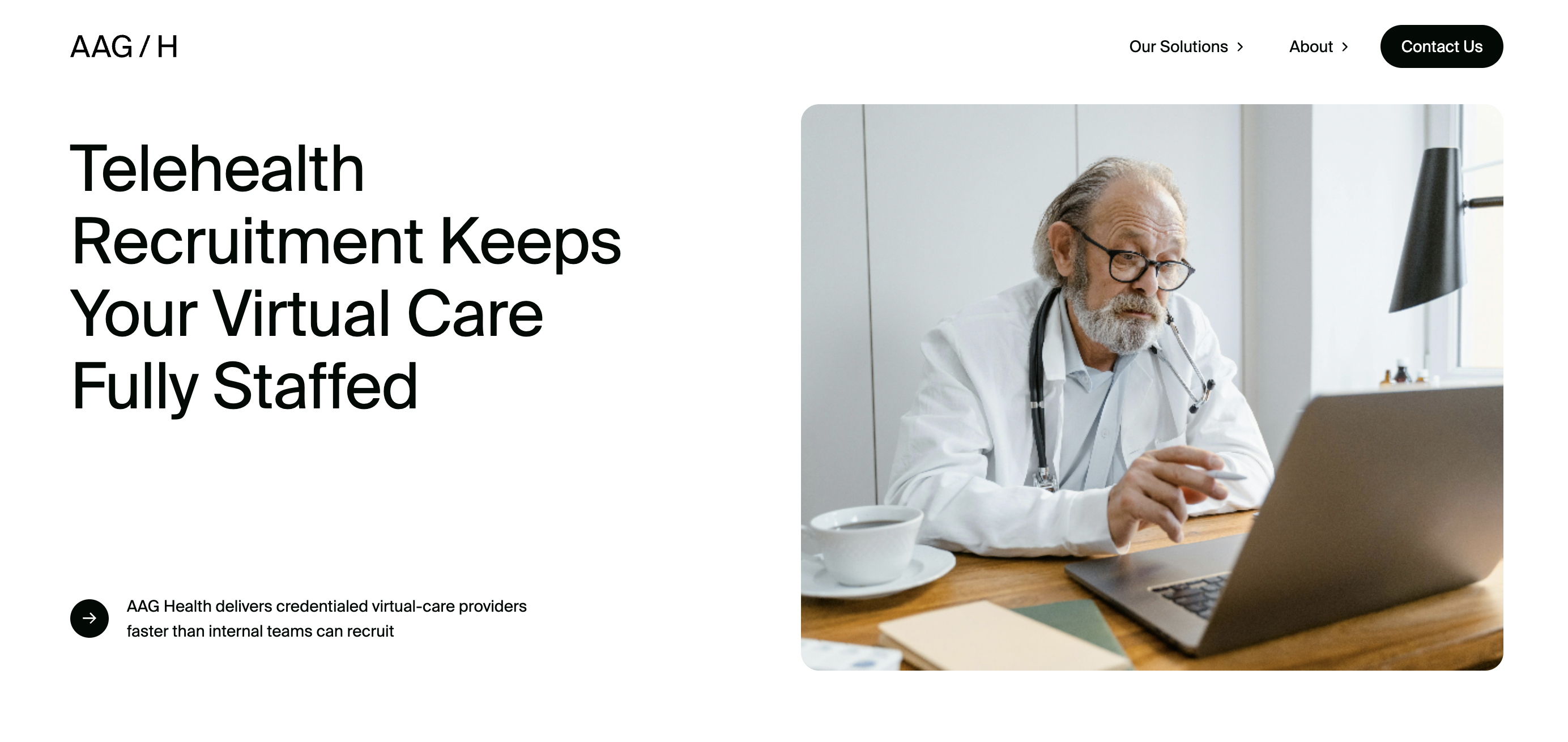
What sets it apart: Deep niche expertise in telehealth-focused recruitment, staffing, and RPO.
What they actually do for clients:
AAG Health acts as an extension of your HR team, handling end-to-end telehealth recruitment: sourcing, screening, credential verification, onboarding, and workforce planning tailored specifically to telehealth roles like nurses, remote patient monitoring clinicians, clinical coordinators, and more.
They maintain a live pipeline of passive, certified professionals, meaning you’re not waiting on job postings: they’re ready when you are.
Importantly, they take responsibility for clinical compliance and manage licensing, background checks, and soft credentialing so your hires are ready to go.
Client benefits include:
- Fast access to pre-screened telehealth professionals, which minimizes program downtime.
- Integration with credentialing tools to reduce legal risk and onboarding friction.
- Workforce planning support to match multi-role hiring plans to your virtual care roadmap.
- Predictable cost model and capacity to scale up or down with program size.
Key services:
- Full-cycle Telehealth RPO
- Role-specific candidate sourcing and screening
- Credential verification and compliance handling
- Virtual workforce scalability and planning
- Dedicated onboarding support
Why Choose Alpha Apex Group Health:
If your organization is scaling telehealth services, Alpha Apex uses RPO-based performance incentives to deliver candidates faster, with less risk and higher compliance, so your HR and clinical teams can focus on running care.
2. Storm3
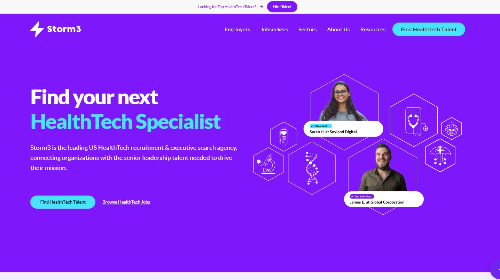
What sets it apart: A micro-specialist model built solely around HealthTech, which means every recruiter focuses on a single vertical like telehealth, genomics, FemTech, or digital therapeutics. That sharp focus gives Storm3 a recruiter-to-client fit few generalist firms can match.
What they actually do for clients:
Storm3 builds leadership and senior-enablement teams for fast-growing telehealth and digital health startups. Each micro-specialist stays immersed in their niche, so they can maintain continuous networks of hard-to-reach professionals in product, data, engineering, clinical operations, and growth roles, all specifically within HealthTech.
Their process includes targeted outreach, multi-step vetting tailored to telehealth regulations (e.g., credentialing across U.S. states or GDPR-ready systems in Europe), and a candidate calibration system that aligns hires with role requirements and company culture.
More importantly, they connect with passive senior candidates who rarely appear on job boards.
They also supplement searches with proprietary benchmarking data on market compensation and DE&I best practices. That way, their clients can design roles and packages that attract qualified professionals from a competitive pool.
Client benefits:
- Faster identification of niche-fit candidates for telehealth-specific roles.
- Compliance-aware screening adapted by market (e.g., EU, U.S., U.K.).
- Data-powered role design: candidates get offers that reflect real market value, reducing renegotiation risk.
Key services:
- Senior and C‑Suite HealthTech placements focused on telehealth verticals
- Candidate sourcing and vetting by vertical micro-specialists
- Market-facing compensation and DE&I benchmarking support
- Multi-region compliance screening and onboarding assistance
Why Choose Storm3:
If you're scaling telehealth services, especially in a startup or Series A/B environment, Storm3 is a recruitment partner that gets your tech stack, understands licensure landscapes, and speaks the language of digital health systems.
3. VISTA Staffing Solutions
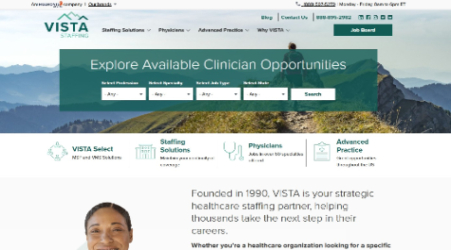
What sets it apart: VISTA combines deep physician staffing expertise with strong telehealth capabilities, being able to set your telehealth system in 72 hours. They’re built for healthcare organizations that need fully licensed, board-certified clinicians ready to work across state lines.
What they actually do for clients:
VISTA is a good partner to have when you’re filling gaps or scaling up a virtual care program. According to statistics, over 90% of hospitals and health systems use locum tenens to fill gaps in care, and that number keeps rising as medical staffing shortages stretch teams thin.
Telehealth is a good alternative in this case, especially if implemented fast. VISTA delivers exactly that.
The agency gets licensed MDs, DOs, and advanced practitioners into telehealth roles with zero credentialing issues for you to handle. After all, their team handles multistate licensure, background checks, and compliance across all 50 states.
They also build specialty-aligned staffing models that match your volume, workflows, and coverage goals. These specialties include hospitalist medicine, emergency medicine, primary care, critical care, psychiatry, and neurology.
More importantly, Vista promises to fill roles as fast as 72 hours and to help you implement an intuitive technology platform for your telehealth services. Vista works well especially for hybrid models that combine telehealth with locum staffing, which are becoming a go-to solution for fast access and burnout relief.
Client benefits:
- Scale fast with pre-credentialed, telehealth-ready clinicians across all 50 states.
- Skip the licensure red tape: VISTA handles it, so your team doesn’t get bogged down.
- Build flexible care models around your real patient volumes, not staffing bottlenecks.
- Get the right clinical fit with specialty-aligned sourcing, from urgent care to psychiatry.
Key services:
- Physician and APP telehealth staffing
- Multi-state credentialing and compliance
- Short- and long-term locum coverage
- Custom virtual care workforce planning
- Specialty-matched clinician sourcing
Why Choose VISTA Staffing Solutions:
When virtual care demand spikes, VISTA keeps you covered with speed, scale, and specialty fit. They deliver licensed providers ready to start immediately and keep your virtual care programs on track without skipping a beat on compliance.
4. DirectShifts
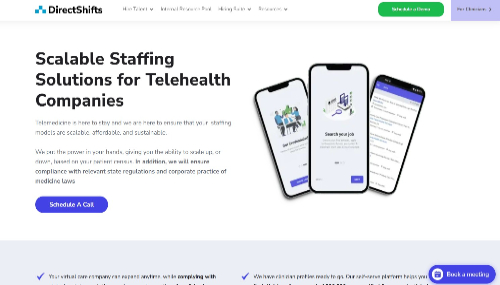
What sets it apart: A tech-first free agent platform that cuts out middlemen. DirectShifts uses a smart staffing system to connect clinicians directly with telehealth employers, without any recruiter gatekeepers.
What they actually do for clients:
DirectShifts is a good alternative to traditional staffing agencies. They put licensed clinicians (physicians, therapists, nurses) into telehealth roles with its proprietary digital platform.
The system manages credentialing, onboarding, scheduling, and compliance, all in a unified dashboard. Employers post their staffing needs, get matched to qualified providers instantly, and track progress from offer to first shift.
This platform has over 800,000 candidates, all screened and credentialed. For one client, they managed to lower hiring costs by 25% and hired four applicants in two weeks.
Client benefits:
- Fill telehealth roles faster with pre-verified providers who are available and matched by specialty, location, and licensure.
- Reduce staffing costs with a platform that handles vetting, credential review, and scheduling, without staffing agency markups.
- Improve provider retention and engagement thanks to transparent onboarding, real-time scheduling tools, and timely feedback loops.
- Clinicians see shift details, compliance status, and employer feedback in real time, so there's less mismatch and fewer onboarding delays.
Key services:
- Platform-based recruitment for telehealth clinicians (physicians, nurses, therapists)
- Integrated digital credentialing and onboarding
- Per diem, shift-based, and full-time placements
- Nationwide access to licensed telemedicine providers
- Compliance management and licensure verification
Why Choose DirectShifts:
When speed, clarity, and cost matter, DirectShifts delivers. Their platform cuts out recruiter lag, speeds up hires, and keeps compliance in check, all while giving both providers and employers control through a polished, digital interface.
5. Soliant Health
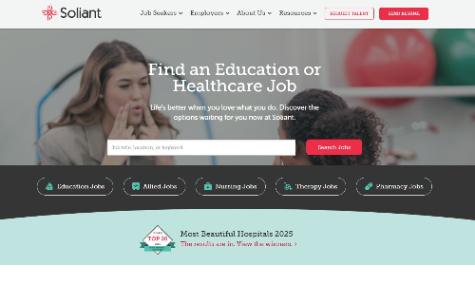
What sets it apart: Soliant Health is active in teletherapy staffing, offering remote roles for licensed therapists and educational health professionals, especially for school-based programs.
What they actually do for clients:
Soliant blends deep K–12 educational staffing expertise with telehealth delivery, specifically aimed at school-based pediatric care. They match districts with certified clinicians (speech‑language pathologists, OTs, school psychologists) trained to operate in virtual education environments.
As a side note, speech‑language pathologist (SLP) roles are among the fastest-growing, projected to increase 21% from 2021 to 2031, with occupational therapy growing 14% in the same period. That demand hits hardest in remote or underserved districts that can’t attract local clinicians.
And with Soliant Health, you can staff for these remote telehealth roles without running separate recruiting programs. Their operations include national reach, so therapists can cover caseloads in different regions virtually. They manage licensing and logistics, so you can launch virtual programs quickly, which is especially useful across multiple states.
Soliant doesn't build proprietary telehealth platforms, but they match you with clinicians who already understand remote care delivery.
Besides, Soliant Health was acquired by Vistria Group for approximately $2.5B in 2024, so it has grown profitably and consistently over the last several years. This also means the company is well-funded and stable.
Client benefits:
- Immediate access to certified teletherapy professionals, even in rural districts.
- Administrative relief: multi-state credentialing, onboarding, and tech training handled centrally.
- Flexible staffing: choose remote, hybrid, or rotating assignments to fit school schedules and needs.
- Higher continuity: familiar therapists return to support students year-over-year, which means less disruption.
Key services:
- Tele‑SLP, OT, school psychologist, and teletherapy therapist placements
- Licensing, compliance, and onboarding coordination
- School-specific staffing plans (remote or hybrid)
- Dedicated account teams aligned with district and student needs
Why choose Soliant Health:
When student support depends on specialized clinical roles, especially in high-need or understaffed districts, Soliant delivers. They accelerate onboarding, build stable care teams, and minimize administrative load, all while maintaining quality and compliance.
6. AMN Healthcare
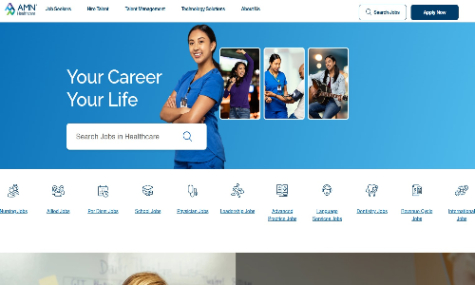
What sets it apart: AMN Healthcare brings the scale of one of the largest locum tenens networks in the U.S. together with dedicated telehealth staffing systems. That means broad clinician access plus telemedicine-ready delivery, across specialties and state lines, with infrastructure to match.
What they actually do for clients:
AMN Healthcare supports telehealth programs by staffing fully licensed, board-certified physicians, nurse practitioners, and behavioral health specialists.
These clinicians are pre-vetted for virtual care roles, so your healthcare organization can quickly expand access without handling recruitment, training, or credentialing internally.
Beyond staffing, AMN manages all multi-state licensing, credentialing, and compliance. That means the new healthcare providers you hire are legally ready to deliver care from the moment contracts are signed.
This is especially valuable if your organization is operating across state lines or scaling regional coverage.
What sets AMN apart is how it integrates workforce planning with technology. Clients can connect staffing to predictive scheduling models, virtual shift coordination, language services, and billing systems. This creates smoother operations, faster onboarding, and more consistent care delivery, especially in high-volume or hybrid telehealth settings. The result is a flexible, fully compliant staffing model that reduces administrative burden while supporting clinical outcomes and revenue performance.
Client benefits:
- Access a nationwide network of licensed providers, ready to deliver telehealth across multiple specialties and shift lengths.
- Reduce time-to-launch via built-in compliance support (licensing, background checks, onboarding).
- Gain access to ancillary tools like language interpretation (powered by AMN’s Stratus Video platform) and workforce analytics to forecast staffing needs.
- Make use of short- and long-term locum or permanent arrangements based on clinical demand and program design.
Key services:
- Telehealth locum tenens for physicians and APPs
- Multi-state credentialing and TX/GAP-compliant licensing
- Short−andlong−term placements
- Integrated workforce planning and telehealth platform support
- Behavioral health, language services, and advanced practice clinician staffing
Why Choose AMN Healthcare:
What makes AMN stand out is their licensure and credentialing speed at scale. Through their centralized systems, AMN can activate telehealth-ready clinicians across all 50 states faster than most internal HR teams can manage solo. For healthcare leaders under pressure to launch or expand virtual care fast, this solves two major pain points: regulatory lag and provider gaps.
7. Alina Telehealth
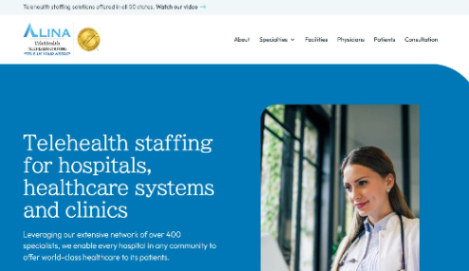
What sets it apart: Alina delivers a full-stack telehealth staffing + clinical model. This model combines portfolio-wide access to 400 specialists across psychiatry, neurology, ICU stroke care, primary care, and more. It also has turnkey infrastructure and operations support that’s JCAHO-accredited. That means power live, compliant teleprograms end-to-end.
What they actually do for clients:
Alina Telehealth provides fully managed virtual care programs across psychiatry, neurology, and primary care. They have a solid network of board-certified physicians, APPs, and behavioral health providers, and they specialize in building scalable telehealth solutions tailored to hospitals and clinics.
Alina handles every operational layer: multi-state credentialing, onboarding, licensing, and tech enablement. And they do it through a secure, HIPAA-compliant platform that supports 24/7 access and smooth integration with client workflows.
What makes Alina stand out is its ability to combine high-volume staffing with operational agility. With access to over 400 specialties, they help organizations expand coverage rapidly, without compromising on care quality. That’s great whether you’re filling short-term gaps or launching full-service virtual programs.
A great example is their work with an Illinois hospital system struggling with delayed access to neuro and psychiatric staff in its emergency department. These bottlenecks led to prolonged patient stays and low throughput.
Alina responded by launching a joint telestroke and telepsychiatry program that brought in specialists within minutes. Neurology consults were delivered in as little as 15 minutes, and psychiatric evaluations were completed in under one hour, even during nights and weekends. Within six months, the hospital saw a 30% increase in patient throughput, faster consult turnaround, shorter lengths of stay, and higher patient satisfaction.
Client benefits:
- Rapid deployment of specialists to meet critical care demands in psychiatric and neurology departments.
- Better operational efficiency through faster consults, shorter patient stays, and predictable workflows.
- A unified partner for staffing, platform integration, scheduling, and regulatory compliance.
- 24/7 coverage including holidays and after-hours with minimal operational burden on internal teams.
Key services:
- Telepsychiatry, telestroke, tele-neurology, tele-primary care coverage
- Nationwide provider staffing spanning 400+ specialties
- Platform setup, credentialing, onboarding, and scheduling
- Emergency and behavioral health consult services tailored to hospital EDs and units
Why Choose Alina Telehealth:
Alina’s biggest edge is their ability to guarantee specialist response times, like psychiatric consults within 1 hour and stroke evaluations in under 15 minutes, across 24/7 coverage windows. For healthcare leaders trying to reduce ED bottlenecks, avoid inpatient delays, or comply with stroke center requirements, that’s a game changer.
8. Medcase
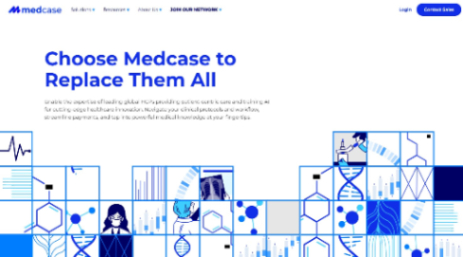
What makes them stand out: Medcase connects you with licensed clinicians in 30+ countries, across 20+ languages, and plug them right into your workflows. This is especially useful if you’re scaling virtual care into new regions or launching a multilingual platform, since they’ve already built the cross-border infrastructure you need.
What they actually do for clients:
Medcase sources and vets doctors, nurses, and specialists for everything from radiology to mental health. They do it fast, and without borders.
They also handle the heavy lift on contracts, licensing, and compliance so you don’t have to.
Besides, Medcase delivers talent for synchronous care, on-demand consults, or even behind-the-scenes clinical QA and AI data labeling.
Unlike traditional telehealth staffing agencies, Medcase is a platform built for scale. As such, it can give digital health companies and enterprise teams a way to deploy care globally without reinventing operations from scratch.
Why Choose Medcase:
If you’re expanding virtual care beyond borders, or need clinicians who (literally) speak your patients’ language, Medcase is an excellent choice.
9. Barton Associates
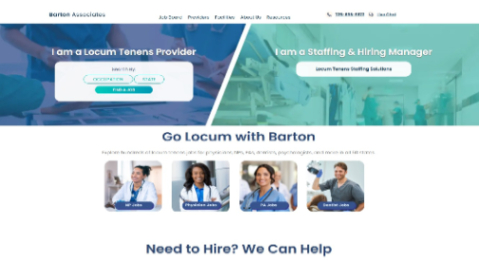
What sets them apart: Barton pairs a massive locum tenens network with flexible telehealth delivery. For healthcare leaders, HR teams, and recruiters, that means one trusted staffing partner for any clinical need, across shift types and specialties.
What they actually do:
Barton Associates is a telehealth staffing agency known for its simplicity and scale. They place physicians, nurse practitioners, and physician assistants into virtual roles across specialties.
In fact, they can cover urgent care, ED support, and chronic care follow-ups, all with multistate-licensed professionals.
What truly sets Barton apart is how low-lift their process is. Their telehealth consultants require only a basic setup (PC, webcam, internet), meaning you can activate remote providers without investing in hardware or navigating IT integrations. That’s a major advantage for hospitals that need to expand virtual services quickly, without operational bottlenecks.
Barton also offers comprehensive logistical support, including licensing assistance, credentialing, scheduling, and account-managed onboarding. This full-service model helps organizations avoid burnout among internal staff, minimize care gaps, and stay compliant across state lines.
Client benefits:
- Barton can place telehealth-ready clinicians fast, which is ideal for covering acute demand or scaling virtual services quickly.
- Using virtual locums cuts provider travel, onboarding delays, and permanent hire overhead while preventing revenue loss by keeping care active.
- Dedicated account managers coordinate licensing, provider interviews, credentialing and scheduling, freeing your internal teams from operational burden.
Key services:
- Telehealth locum tenens for physicians, nurse practitioners, and physician assistants
- Multi-state licensing, credentialing, and onboarding support
- Temporary (daily, monthly) or longer-term virtual coverage
- 24/7 support and account management aligned to facility workflows
Why choose Barton Associates:
When telehealth roles are critical, from behavioral health consults to virtual primary care, having access to licensed clinicians across states in a unified platform is a massive advantage. Barton’s strength lies in fast placement, widespread provider availability, and low admin lift.
10. CHG Healthcare
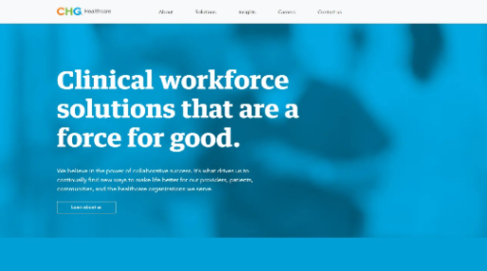
What sets them apart: CHG Healthcare claims to represent over 21% of all U.S. locum tenens staffing and place more than 10,000 clinicians annually, caring for over 11 million patients each year. That scale gives healthcare leaders confidence: clinicians are licensed, available, and ready, including for telehealth roles.
What they actually do:
CHG Healthcare has staff telehealth programs with board-certified physicians, advanced practitioners, and behavioral health specialists. They have access to experts across specialties like urgent care, psychiatry, and primary care.
And like many agencies in this roundup, they can manage the full credentialing and licensing process for multiple states so staff can go virtual faster.
But what genuinely sets them apart is how they coordinate planning around patient volume, platforms, billing, and integration into your telemedicine workflows.
Client benefits:
- Rapid deployment: Telehealth-ready clinicians activated within days, perfect for urgent care or surge capacity.
- Staff relief & retention: Reduces burnout among permanent staff by offering flexible coverage, which boosts retention and maintains morale.
Services delivered:
- Telehealth locum tenens staffing for physicians, NPs, and PAs
- Multi-state licensing, credentialing, onboarding support
- Short- and long-term placement options
- Telehealth platform coordination and workforce forecasting
Why Choose CHG Healthcare
CHG’s real edge lies in their multi-state credentialing speed and operational abilities. If you’re a healthcare leader trying to scale telehealth across regions, or cover staffing gaps without burning out core teams, CHG shortens deployment time with a plug-and-play approach.
What to Look for in a Telehealth Recruiting Partner (and What to Watch Out For)
1. Proven ability to source multi-state licensed clinicians fast
In telehealth, licensing delays kill deployment speed. A strong RPO partner should already have pipelines of pre-credentialed providers ready to go.
- Red flag: The firm relies on you to manage licensure logistics or shows unfamiliarity with cross-state compacts like IMLC or PSYPACT.
- Ask this: “Can you walk me through your average licensure timeline for a clinician that needs three or more state approvals?”
2. Integration with your virtual care workflows and platforms
An RPO that understands your EMR, scheduling tools, and telehealth tech will place better-aligned talent and reduce onboarding friction.
- Red flag: They don’t ask which platform you’re using (e.g., Amwell, Zoom for Healthcare) or how scheduling and documentation work on your side.
- Ask this: “What platform experience do your candidates have? Do you support role-specific tech ramp-up?”
3. Experience with regulated environments (e.g., correctional, behavioral, pediatrics)
Hiring for a pediatric speech teletherapist isn’t the same as staffing urgent care. Your telehealth staffing agency should understand the nuances around compliance, consent, and documentation.
- Red flag: They treat every telehealth job as interchangeable and can’t speak to specialty-specific onboarding requirements.
- Ask this: “What experience do you have placing clinicians in [your setting]? How do you train for HIPAA, FERPA, or DOJ compliance?”
4. Real-time visibility into candidate pipelines and performance metrics
You can’t optimize hiring blind. You need partners who give you dashboards, funnel data, and recruiter-level transparency.
- Red flag: All reporting is manual or post-hire only. They can’t tell you where candidates are falling off.
- Ask this: “What metrics do you track around sourcing and conversion? Can I see time-to-fill and drop-off points in real time?”
5. Post-placement follow-through and clinician performance tracking
The relationship shouldn’t end on day one. Your RPO should track how hires are performing and how to adapt future searches accordingly.
- Red flag: They celebrate the hire, then vanish. No onboarding feedback loop or performance follow-up.
- Ask this: “How do you track clinician success post-hire? Can you give an example of how that feedback improved future placement quality?”
6. Scalability and shift coverage flexibility
Whether you're opening a new virtual clinic or covering weekend gaps, your RPO should handle surge demand without making you start from scratch.
- Red flag: They struggle to ramp up volume, require long lead times, or charge premiums for off-hours coverage.
- Ask this: “How do you flex recruiting capacity for unplanned demand spikes? What’s your average fill time for last-minute telehealth needs?”
Check out the graphic below for a summary of these factors:
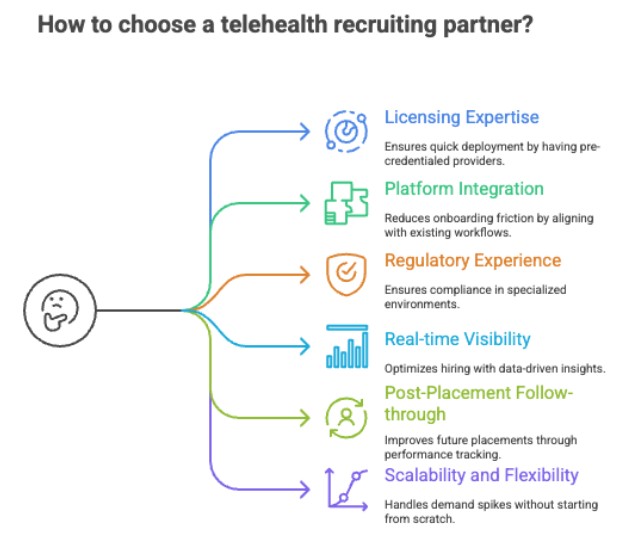
Wrapping Up: Smarter Telehealth Hiring Starts Here
Telehealth staffing works best when it helps you find clinicians who can work well in complex, regulated, and fast-moving virtual environments. For healthcare leaders and HR teams, that means choosing recruiting partners who go beyond resumes and actually understand the care model you're scaling.
Among the firms listed, Alpha Apex Group Health (AAGH) rises to the top. Their edge? Speed, precision, and deep telehealth know-how. With a time-to-fill that's 60% faster than the industry average and a tech-forward approach, AAGH helps you build virtual care teams that are high-performing and future-ready.
So, contact us today and see exactly how we can help you fill in your telehealth organization’s roles.
Pro tip: Enjoyed this article? You might also find some value in our piece on The 81 Most Shocking Healthcare Staffing Statistics of 2025.
FAQ: Finding the Perfect Telehealth Recruiting Partner
What is the best healthcare recruiting company?
The “best” depends on your needs, but Alpha Apex Group Health stands out for telehealth hiring thanks to its fast time-to-fill, tech-enabled sourcing, and deep virtual care expertise. For broader healthcare roles, firms like AMN Healthcare and CHG Healthcare are also industry leaders with national reach.
Who is the largest telehealth provider?
As of 2025, Teladoc Health remains the largest telehealth provider globally, serving over 90 million members across many countries with services spanning primary care, mental health, and chronic condition management.
What is the best platform for telehealth?
Top-rated platforms include Amwell, Teladoc Health, and Doxy.me, depending on use case. Amwell is often preferred by large systems for enterprise-grade integration, while Doxy.me is popular for its simplicity and HIPAA compliance in smaller clinical settings.
What is the biggest advantage to telehealth?
The biggest advantage is access: telehealth reduces geographic and logistical barriers, making care more available to rural, underserved, or mobility-limited patients. It also improves continuity, lowers no-show rates, and expands capacity during staffing shortages.
What is the world's largest telemedicine app?
Teladoc Health’s mobile app is currently the most widely used, with millions of downloads and active users globally. It supports a wide range of services, including urgent care, therapy, and chronic condition management.

